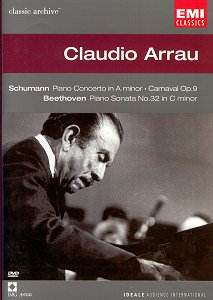This fascinating DVD may be in danger of missing its
target audience. The front cover announces only "Claudio Arrau"
and yet the best reason for owning it is the presence of a "bonus"
item. Nothing less than the only film in existence of the great pianist
Solomon, and giving a magisterial performance of the Appassionata.
Since he suffered his debilitating stroke within months of this performance
he has to be regarded as caught at the height of his powers. For me
this 20 minutes is enough reason to own the DVD. Why have the marketeers
not made more of this? But do not let a production oversight put you
off an essential purchase. Arrau turns in fine performances of Beethoven
and Schumann, even if he isn’t Solomon.
Let us dispose of the technicalities first. All four
films are archive quality black and white and the sound tracks are mono.
Solomon’s film from 1956 is satisfactory for its period and Arrau’s
film of the Schumann Concerto is also acceptable for 1963. There is
some sound and picture disturbance in the 1961 Carnaval performance
but it passes and the 1970 Arrau Beethoven performance, though the most
recent, does include a short period of flutter. The picture at this
point is also rather gritty. The camera stays mainly on the pianists
and especially their fingers, has little of the pointless wandering
that stands in for "production" in modern music films and
there is no arty stuff at all. Current producers please note.
Interpretatively there is much interest in these four
performances. If one just wanted to hear these artists then much superior
audio recordings are available, so one’s attention must be on the most
important visual aspects. Both these keyboard masters are calm and concentrated
in their manner. There is no flamboyant flailing of the arms such as
some artists display. Perhaps my excitement at seeing Solomon on film
at all made his seem the more concentrated and impressive manner. This
pair hale from different schools of pianism, Solomon uses the sharply
arched fingers of the Leschetizky school, rarely seen nowadays, whereas
Arrau plays with the more flattened fingers commonly used today. The
natural interest of collector-viewers in the pianos used is frustrated
by the BBC’s decorous obscuring of the manufacturer’s name in their
films. Only in Arrau’s Beethoven, sourced from France, are we allowed
to see the name Steinway and Sons. Arrau’s performance of the Schumann
Concerto is good but unremarkable. If the picture were not the overriding
reason to buy the disc I would say go back to Dinu Lipatti for a well
nigh perfect rendering with sound not much more archaic than the present
issue. Lipatti’s performance is more passionate and shows more willing
use of rubato. Also he has the benefit of a more characterful orchestral
accompaniment from the Philharmonia and Karajan than is provided by
George Hurst and the London Philharmonic. But of course the picture
is important and it is very absorbing to see a master performer
in action. Any serious collector already has Lipatti, and probably Solomon
too, in this concerto. Carnaval is much more a one-man show,
since the cameraman is well under control, and here Arrau is clearly
in his element. I liked the BBC production decision to use the score
title page for each "scene". In a work this complex it helps.
Arrau has full command of Schumann’s subtle use of rhythm in these wonderful
variations. At times one is caught completely off guard by the sheer
modernity of the writing. The Beethoven Sonata Op.111 absorbed me less
but others may well be more on a wavelength with Arrau.
Finally to Solomon. Superlatives are always heaped
on this pianistic genius for his total technical control as well as
apparently effortless revelation of the music. This Appassionata
is magnificent in every respect: dramatic and lyrical by turns. And
what turns! The way in which Solomon controls the lightning changes
of mood is breathtaking. Does my bias show? Well, never mind, it is
wonderful to be able to see him in action and to have confirmed what
those able to attend a concert have always said, he was a musician non-pareil
and absolutely in command. I was most taken by his quietly satisfied
smile and bow to the camera at the end of this studio film.
An essential purchase for lovers of great musicianship
and for a unique opportunity to actually see Solomon in action.
Dave Billinge
